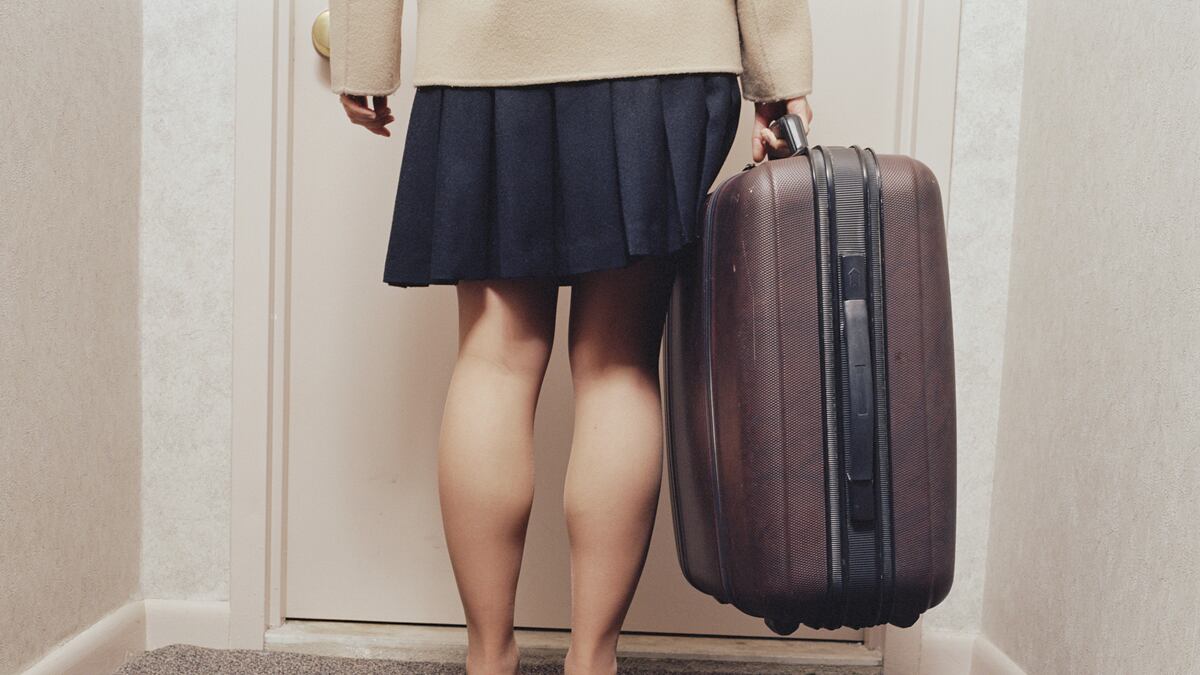Within months of each other, both of Barbara Crowley’s twentysomething daughters unexpectedly returned home to Dallas. Jaime, 26, arrived first. She’d been a ski bum with a boyfriend in Jackson Hole, Wyo., and had applied to graduate school to earn a doctorate in clinical psychology. After being accepted by programs around the country, Jaime picked a local university to take advantage of in-state tuition. She informed her parents that she’d live at home for the first year of her program to make life easier for her.
“My husband, Geoff, and I were OK with that,” Barbara says. They never expected Jaime’s older sister, Evelyn, 29, who’d been living for four years in New York, to show up, too. She’d been working for a fashion magazine, but became weary of writing about blindingly beautiful crystal earrings, price upon request. “Kids this age become rudderless, looking for the next best thing. To my husband’s and my dismay, Evelyn quit her job without another one lined up. When she arrived in Dallas and looked back, the magazine industry had collapsed. She saw Sodom and Gomorrah, with layoffs everywhere.”
The Jaime-and-Evelyn show happened when the Crowleys had just sent off their youngest child, a son, to Northwestern University. Their empty nest, which they’d started to savor, refilled after just months. “People who told me ‘It’s so nice—your daughters are back’ had it wrong. For starters, the two don’t get along. Having them here again in their twenties? Not fun. I found that I reverted to a housewife stereotype as servile as my grandma. If you raised your kids like I did—overly motherly—it’s very hard to get out of that mind-set when adult children return.
“A remnant of you worries the same way you did when they were teenagers,” she says. “It became high school revisited—the laundry, the cooking, the concern about the girls’ driving in our urban sprawl, the getting home late and the making sure they got up on time. I fell back into complete Mom-mode.”

Few boomer mothers I know behave unlike Barbara Crowley. When adultescents return home, mothers tend to reinvest full throttle in their dormant parenting role. We’ve all heard the Jonas Salk quote, “Good parents give their children roots and wings.” But I wonder if every Mom I know hasn’t secretly installed a chip under her kids’ skin to make sure they are returned to us like lost dogs, simply so we can bluster and blow in one more giant gust of motherhood.
“When you’ve been the coach, architect, and main cheerleader of your child’s development for 20 years, it’s difficult to back away, especially if kids are struggling,” says Sylvia Gearing, a Dallas psychologist. “Many women have to be encouraged to refrain from the bad habit of over-identifying with the child. This can be a Herculean feat.”
“Often when parents experience boomerang kids, it makes the mother and father feel as if they haven’t done their job correctly,” says Gina Heyen, a licensed marriage and family therapist in Wichita, Kan. “It’s especially painful for them to see their kids suffer.”

Wichita is the country’s aircraft capital, home to manufacturing plants for Boeing, Lear, and Cessna, among others. As airlines and other Fortune 500 corporations have stopped ordering new jets, jobs have been swept away. “We’re strong on family values here,” Heyen says, which calls into question a parent’s role when kids’ lives go off the rails. She cites a solid, long-term marriage that threatened to shatter when a prodigal daughter in her thirties returned home with more than $60,000 of debt. Not long after, her sister, in her twenties with heavy student loans, showed up, too.
“The girls started to use the house mostly as a hotel. Only after the daughters had been home for a few years did the family come to me for counseling,” Heyen says. “By then, the father was feeling overwhelmed, dipping into his retirement savings because he felt as if he was still the provider who had to pay, pay, pay. The mother took a different approach. She had other ideas for how to use their money. ‘We’re done,’ she’d decided. ‘In fact, we’ve been done having kids at home for a very long time.’ ”
Heyen helped the family steer the daughters toward networking, volunteering, and researching state programs for housing, Medicaid, disability, student loans, and consumer counseling—resources this family had never needed. The father decided to research the programs with the daughters to see if utilizing them would create more financial independence for everyone. “The mother wanted them gone in 30 to 60 days, but the standard of living the girls would have faced under those conditions was a concern for the father. She had to compromise on a six-month time line.”
In Sharon Gilchrest O’Neill’s practice of more than 20 years in New York’s Westchester County, she used to see virtually no cases of boomerang adultescents. Now she sees many: “I try to work with the parents first. They usually have to be reminded that the No. 1 rule of parenting is that a mother and father need to work as a team to make sure that kids don’t play you off one another. It’s important to talk through boundaries. Will you let your adult child drink at home? Smoke pot? Does the child get his own room back? What bathroom does he use? Will a boyfriend or girlfriend sleep over? ‘I don’t want to see some guy walking around in his underwear,’ one dad complained.”
Like a referee joined to a judge, O’Neill reminds parents that it’s still their home, no matter how old the kids are. “Often the parents feel that because the child is in the 20-to-30 age group, they can’t set boundaries.” Hooey, she says. A return home can get especially tricky for both parents and kids when, while they lived on their own, adultescents have grown up more than their parents realize or can accept. “I saw one sensible girl of 25 who came home though she didn’t really want to,” O’Neill reports. “She’d lost a good job in finance and, as a result, hadn’t lived up to her own expectations, but she couldn’t afford to have her own apartment anymore. While she’d been on her own, she’d gone to therapy and addressed having a mom who always wanted to know everything about her.” Now the mother is in therapy with O’Neill, trying to reinvent her idea of what it means to be a loving parent. This starts with no longer cross-examining her daughter every day in hopes of creating closeness.
“Having done our best to move out of our own parents’ homes as soon as we could to get on with adult life, we never expected our own children to return,” says Marie Hartwell-Walker, author of Tending the Family Heart. “Yes, we love our children to death. Yes, we do want to help them out. But at this stage, we didn’t think we’d still be buying milk by the gallon and family-size packs of hamburger. We thought that just maybe there’d be a little extra money to go out to dinner, indulge in a movie, or even take a trip or two. Then we become upset to find out that the only place where our kid can afford to live on what he makes is one room in a wet basement in an unsafe part of town. We may want to stop active parenting, but we also want our children to be safe and have an opportunity to get back on their feet. Parental feelings become a mix of being glad to help, weary of accommodating, resentful for feeling like they have to do so, and guilty for feeling resentful.”
Can you say ambivalent? It’s complicated? And how about judgmental, especially if parents say or at least think “I told you so,” frustrated by pinheaded or entitled choices their kids have made—and that the parents cautioned them against? Hartwell-Walker harrumphs at adultescents who want to move back in with parents after they have found a job but just don’t love it—and thus quit—or because living rent-free allows them luxuries: payments on late-model cars and smartphones.
“The parental safety net isn’t always used for safety. Sometimes it’s for lifestyle. We’re in danger of infantilizing our adult children, who are failing to distinguish between want and need. When I speak to my peers, everyone has stories of old jalopies and apartments furnished in Late Attic,” Hartwell-Walker says. “There was a pride from having come through that successfully. The shared remembering has helped make us strong. A lot of kids will miss that.”
She has no sympathy—nada—for kids who want too much. “When I see parents overdo it, as a therapist I try to find a gentle way to tell them they’re not helping their children. The subliminal message that comes with all the giving and doing is, ‘We don’t think you can do it on your own— we need to do it for you.’ ”
Saying this apparently snaps Hartwell-Walker back to reality, too. “I want to be careful about how I generalize because I don’t think all kids today are spoiled. A lot of them work hard.” Not every kid who returns home suffers from bombastic dreams matched only by their lack of direction and flabby self-discipline.
In The Trophy Kids Grow Up: How the Millennial Generation Is Shaking Up the Workplace, author Ron Alsop wrote, “If there is one overriding perception of the Millennial generation, it’s that these young people have great—and sometimes outlandish—expectations.” Hartwell-Walker takes issues with such a slur. “Yes, there are those who spend more time in the virtual than the actual world, making relationships with people they will never meet... kids who think they are entitled to get what they want just because they want it... students who debate their professors’ evaluation of lackluster work on the grounds that they ‘tried hard’... with parents who want so much to do a better job than their own parents that they go overboard and extend adolescence sometimes into the thirties. These are parents who can’t seem to find a way to tell their kids to grow up and get on with life.
“But there is only a slice that’s spoiled,” she stresses. In this category she excludes adultescents who’ve graduated from college and try mightily to get a job, only to bump into continuous rejection, just as she offers profound sympathy for those who lose jobs due to economic upheaval. Some of these adultescents take a severe hit to their self-esteem. Returning home to loving parents can sometimes at least bandage that boo-boo, and it is unequivocally the smartest step, she maintains, that both parents and child can take. In the case of many adultescents today, the majority of empty-nest parents are simply saying, “Let’s all get real; you, my child, have a problem and we have a house with an extra bedroom. Honey, come on home.”
Reprinted by arrangement with Viking Penguin, a member of Penguin Group (USA) Inc., from Slouching Toward Adulthood by Sally Koslow.






